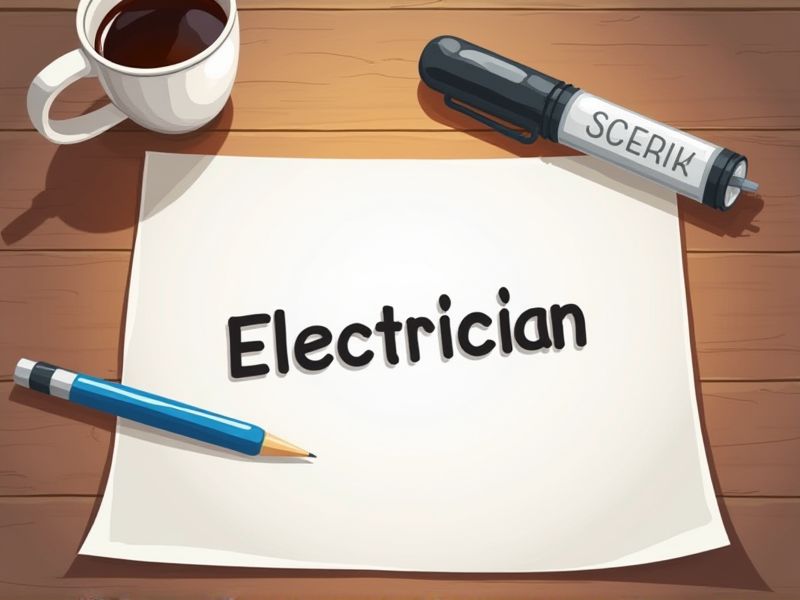
High voltage electricians work with electrical systems that carry significant risk, so comprehensive knowledge and skill are crucial for safety and effectiveness. Certification ensures that electricians are trained to meet industry standards, which directly impacts operational reliability and safety compliance. Various certifications validate specialized expertise in managing complex electrical systems, thereby reducing the risk of accidents and enhancing system performance. Here are some key certifications required for a high voltage electrician.
Journeyman Electrician License (State-specific)
High voltage electricians often deal with complex electrical systems, which require a journeyman electrician license to ensure they have the necessary skills and knowledge. State-specific licenses confirm that the electrician understands local electrical codes and safety standards that vary from region to region. This license acts as a validation of experience, generally requiring several years of apprenticeship and passing a rigorous exam. Acquiring this credential enhances trust with clients and employers, promoting reliability in high-stakes environments.
Master Electrician Certification (State-specific)
State-specific Master Electrician Certification ensures compliance with regional electrical codes, reducing legal risks for high voltage electricians. This certification often leads to better safety practices, as it encompasses advanced training on local electrical systems and high-risk scenarios. Employers usually prefer certified electricians, as it signals a higher level of expertise and reliability. Possessing this certification can result in higher earning potential due to the increased trust and credibility it instills.
NFPA 70E Electrical Safety Certification
High voltage electricians face significant electrical hazards, and NFPA 70E Electrical Safety Certification provides essential guidelines to mitigate these risks. By standardizing safe work practices, this certification helps prevent electrical injuries and fatalities in the workplace. Employers recognize this certification as a benchmark for competency in managing electrical systems safely. Compliance with NFPA 70E is often mandated by regulatory bodies to ensure a uniform safety protocol across different organizations.
OSHA 30-Hour Construction Safety Certification
OSHA 30-Hour Construction Safety Certification equips high voltage electricians with crucial safety understanding specific to construction settings. With this knowledge, electricians can effectively identify and mitigate workplace hazards, reducing the likelihood of accidents. Training under the certification promotes a culture of safety, which is essential when dealing with high voltage operations. Regulatory compliance through OSHA certification helps avoid legal liabilities and potential financial penalties.
High Voltage Safety Training Certification
High Voltage Safety Training Certification is necessary for high voltage electricians to ensure they are equipped with the knowledge to prevent workplace accidents and electric shock incidents. It helps them understand and implement proper safety protocols that reduce the risk of injuries when working with high-power electrical systems. Employers require this certification to comply with legal regulations and standards, promoting a safe working environment. The training also enhances an electrician's credibility and employability, indicating a commitment to safety and professional development.
Arc Flash Awareness Certification
Arc Flash Awareness Certification is essential for high voltage electricians because it directly enhances their understanding of the potential hazards associated with arc flash incidents. These incidents can cause severe injuries or fatalities, hence certification ensures that electricians are equipped with knowledge to implement preventive measures effectively. The training also helps in minimizing equipment damage by promoting safe work practices and compliance with safety regulations. Employers often require this certification to ensure a safer working environment and reduce liability risks.
Electrical Testing & Diagnostic Certification
High voltage electricians often work with complex systems where safety and reliability are critical; electrical testing and diagnostic certification ensures they possess the necessary skills to identify potential issues accurately. Certification provides a standardized measure of competency, reducing the risk of equipment failure and electrical accidents. Regulatory bodies and employers prioritize certified individuals, as it demonstrates adherence to industry standards. Engaging in continuous certification validates proficiency in the latest technologies and practices, essential in the rapidly evolving electrical field.
Certified Electrical Safety Compliance Professional (CESCP)
The need for a Certified Electrical Safety Compliance Professional (CESCP) for a High Voltage Electrician arises from strict adherence to safety regulations; reducing the likelihood of accidents is crucial when handling high-voltage systems. CESCP certification ensures that electricians possess the necessary knowledge to implement best practices and maintain compliance with national electrical safety standards. High-voltage systems pose significant risks, and having a CESCP-certified professional assures organizations that these systems are managed by individuals knowledgeable in mitigating potential hazards. Incidents involving high voltage can result in severe consequences; therefore, certified professionals are essential to ensure safety and operational efficiency in electrical environments.
Confined Space and Lockout/Tagout Certification
High voltage electricians often work in environments with confined spaces, which pose significant risks of hazardous atmospheres; thus, certification ensures they have the necessary skills to safely navigate these areas. Proper Lockout/Tagout procedures prevent unexpected machinery startups that can cause electrical shocks or arc flashes, critical knowledge for reducing workplace accidents. Certification provides electricians with updated safety protocols and compliance with regulatory standards. Employers prioritize hiring certified individuals, knowing they contribute to a safer work environment and reduced liability.
CPR and First Aid Certification
High voltage electricians face increased risks of electrical shocks and other workplace injuries. CPR and First Aid certification provides the necessary skills to respond effectively during emergencies, potentially saving lives. Knowledge of these practices ensures that electricians can stabilize situations until professional medical help arrives. Regulatory bodies and employers often mandate such certifications to ensure workplace safety compliance.
Summary
When you pursue certifications as a High Voltage Electrician, you increase your marketability and potential for higher earnings. These certifications validate your skills, making you more attractive to employers seeking specialized expertise. Employers often prioritize certified electricians for complex and high-stakes projects, potentially accelerating your career advancement. Your enhanced certification credentials may also lead to increased job security in a competitive industry.
